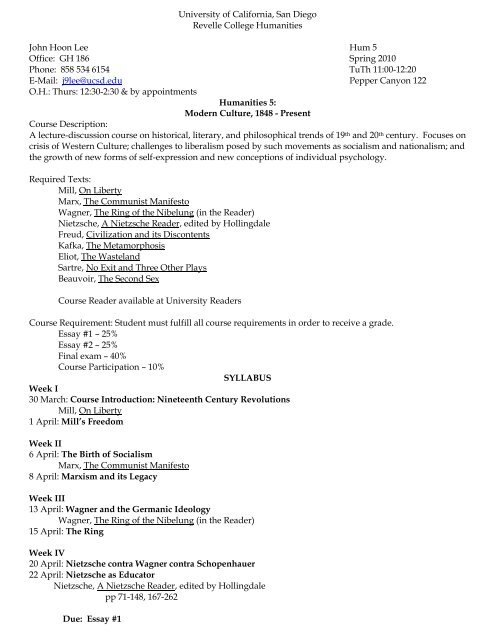GH 186 - Revelle College
GH 186 - Revelle College GH 186 - Revelle College
University of California, San Diego Revelle College Humanities John Hoon Lee Hum 5 Office: GH 186 Spring 2010 Phone: 858 534 6154 TuTh 11:00-12:20 E-Mail: j9lee@ucsd.edu Pepper Canyon 122 O.H.: Thurs: 12:30-2:30 & by appointments Humanities 5: Modern Culture, 1848 - Present Course Description: A lecture-discussion course on historical, literary, and philosophical trends of 19 th and 20 th century. Focuses on crisis of Western Culture; challenges to liberalism posed by such movements as socialism and nationalism; and the growth of new forms of self-expression and new conceptions of individual psychology. Required Texts: Mill, On Liberty Marx, The Communist Manifesto Wagner, The Ring of the Nibelung (in the Reader) Nietzsche, A Nietzsche Reader, edited by Hollingdale Freud, Civilization and its Discontents Kafka, The Metamorphosis Eliot, The Wasteland Sartre, No Exit and Three Other Plays Beauvoir, The Second Sex Course Reader available at University Readers Course Requirement: Student must fulfill all course requirements in order to receive a grade. Essay #1 – 25% Essay #2 – 25% Final exam – 40% Course Participation – 10% SYLLABUS Week I 30 March: Course Introduction: Nineteenth Century Revolutions Mill, On Liberty 1 April: Mill’s Freedom Week II 6 April: The Birth of Socialism Marx, The Communist Manifesto 8 April: Marxism and its Legacy Week III 13 April: Wagner and the Germanic Ideology Wagner, The Ring of the Nibelung (in the Reader) 15 April: The Ring Week IV 20 April: Nietzsche contra Wagner contra Schopenhauer 22 April: Nietzsche as Educator Nietzsche, A Nietzsche Reader, edited by Hollingdale pp 71-148, 167-262 Due: Essay #1
University of California, San Diego<br />
<strong>Revelle</strong> <strong>College</strong> Humanities<br />
John Hoon Lee Hum 5<br />
Office: <strong>GH</strong> <strong>186</strong> Spring 2010<br />
Phone: 858 534 6154 TuTh 11:00-12:20<br />
E-Mail: j9lee@ucsd.edu Pepper Canyon 122<br />
O.H.: Thurs: 12:30-2:30 & by appointments<br />
Humanities 5:<br />
Modern Culture, 1848 - Present<br />
Course Description:<br />
A lecture-discussion course on historical, literary, and philosophical trends of 19 th and 20 th century. Focuses on<br />
crisis of Western Culture; challenges to liberalism posed by such movements as socialism and nationalism; and<br />
the growth of new forms of self-expression and new conceptions of individual psychology.<br />
Required Texts:<br />
Mill, On Liberty<br />
Marx, The Communist Manifesto<br />
Wagner, The Ring of the Nibelung (in the Reader)<br />
Nietzsche, A Nietzsche Reader, edited by Hollingdale<br />
Freud, Civilization and its Discontents<br />
Kafka, The Metamorphosis<br />
Eliot, The Wasteland<br />
Sartre, No Exit and Three Other Plays<br />
Beauvoir, The Second Sex<br />
Course Reader available at University Readers<br />
Course Requirement: Student must fulfill all course requirements in order to receive a grade.<br />
Essay #1 – 25%<br />
Essay #2 – 25%<br />
Final exam – 40%<br />
Course Participation – 10%<br />
SYLLABUS<br />
Week I<br />
30 March: Course Introduction: Nineteenth Century Revolutions<br />
Mill, On Liberty<br />
1 April: Mill’s Freedom<br />
Week II<br />
6 April: The Birth of Socialism<br />
Marx, The Communist Manifesto<br />
8 April: Marxism and its Legacy<br />
Week III<br />
13 April: Wagner and the Germanic Ideology<br />
Wagner, The Ring of the Nibelung (in the Reader)<br />
15 April: The Ring<br />
Week IV<br />
20 April: Nietzsche contra Wagner contra Schopenhauer<br />
22 April: Nietzsche as Educator<br />
Nietzsche, A Nietzsche Reader, edited by Hollingdale<br />
pp 71-148, 167-262<br />
Due: Essay #1
Week V<br />
27 April: Nietzsche’s Critique of Western Civilization<br />
29 April: Freud and the Mind<br />
Freud, Civilization and its Discontents<br />
Week VI<br />
4 May: Constraint of Civilization<br />
6 May: Austria 1900<br />
Kafka, The Metamorphosis and Conversation with the Supplicant<br />
Week VII<br />
11 May: It’s a Bug’s Life<br />
13 May: The Malaise<br />
Eliot, The Wasteland and The Love Song of J Alfred Prufrock<br />
Week VIII<br />
18 May: The Great War<br />
20 May: Anti-Semitism and the Nazi Revolution<br />
Due: Essay #2 – Final Hum Essay!<br />
Week IX<br />
25 May: Freedom, Choices, and Responsibility<br />
Sartre, The Flies<br />
27 May: Those Pesky Flies<br />
Week X<br />
1 June: Woman’s Freedom in a Man’s World<br />
De Beauvoir, The Second Sex<br />
pp xix-xlii, 38-60, 679-732<br />
3 June: The Final Hum Lecture!<br />
8 June: Final Exam, Tuesday 11:30-2:30<br />
Important Information<br />
Students are expected to submit only their own work on papers and examinations. While you may discuss the assignments<br />
with others in the class, collaboration on the preparation of a paper is not permitted. Unless the assignment specifically<br />
directs otherwise, papers should be based entirely on your own study of the assigned material and not on secondary<br />
sources of any kind.<br />
Turning in someone else's work, whether from printed sources or material available electronically, as if it were your own<br />
constitutes plagiarism. Plagiarism is an act of intellectual dishonesty. The academic consequences of plagiarism range<br />
from failure for the tainted assignment to failure for the course, depending on the seriousness of the offense. All such<br />
offenses are reported to the college dean, who will impose additional administrative consequences, which can include<br />
suspension or expulsion from the university.<br />
Examples of plagiarism include, but are not limited to the following: turning in another student's paper as if it were your<br />
own; collaboration with another student in writing the paper; quoting, paraphrasing, or borrowing ideas from published or<br />
unpublished material written by someone other than yourself, without specific acknowledgment of the source.<br />
If you have any questions about what constitutes plagiarism, you should consult with your section instructor.



